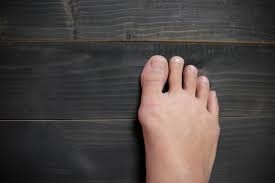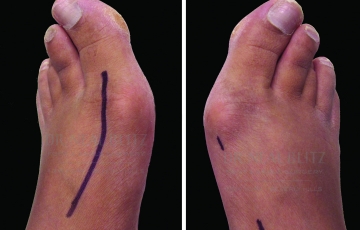

Big toe arthritis (Hallux Rigidus)
Big toe fusion
Flat foot deformity
Treatment of hammer toe or claw toes
Plantar plate repair
Bunionnette correction
Removal of Ganglion
Removal soft tissue lumps and bumps
Morton Neuroma
Nerve entrapment
Haglund's deformity
Achilles Tendonitis
Heel pain
Ankle and Subtalar fusion
Ankle arthroscopy
Sports related injuries
Foot and Ankle injections
Ankle ligament reconstruction
Tendon disorders including tendo-achilles
PRP injection (Platelet Rich Plasma Therapy)
Treatment of ingrowing toe nail
Mr. Vail Karuppiah is a highly experienced Consultant Orthopaedic Surgeon specialising in foot and ankle surgery. Based in Nottingham, he provides expert care for a wide range of conditions, including minimally-invasive bunion surgery, ankle replacement, and adult-acquired flat foot. He also offers advanced treatments such as first MTP joint replacement, keyhole surgery for plantar fasciitis, and foot and ankle deformity correction. Mr. Karuppiah practices privately at the Woodthorpe Hospital in Nottingham, while his NHS base is Nottingham University Hospital NHS Trust.
Specialised Expertise in Foot and Ankle Surgery
With a reputation for excellence across the East Midlands, Mr. Karuppiah is the only surgeon in the region offering minimally-invasive bunion surgery. This groundbreaking technique provides numerous benefits, including faster recovery times, reduced complications, and minimal time off work, enabling patients to return to their daily lives sooner.
Mr. Karuppiah's holistic approach ensures that surgery is just one part of a comprehensive treatment plan aimed at helping patients regain their mobility, functionality, and overall quality of life. His additional areas of expertise include:
Educational Background and Advanced Training
Mr. Karuppiah's extensive medical training began with an MBBS in Medicine from the prestigious Jawaharlal Institute of Postgraduate Medical Education and Research (JIPMER) in India. His surgical career commenced in Scotland, followed by further specialist training on the National Orthopaedic Training Programme in the East Midlands. During this time, he gained invaluable experience at leading hospitals, including:
To refine his skills further, Mr. Karuppiah undertook international fellowships in South Africa and Australia, where he gained advanced expertise in complex foot and ankle surgeries.
Commitment to Education, Research, and Professional Excellence
In addition to his clinical practice, Mr. Karuppiah is deeply involved in medical education and academic research. He served as a clinical tutor at the University of Aberdeen and has authored publications in respected international journals. His commitment to sharing knowledge extends to organising and presenting at national and international seminars, contributing to advancements in orthopaedic surgery.
Professional Memberships and Accreditations
Mr. Karuppiah is recognised as a leader in his field and holds several esteemed professional memberships and accreditations, including:
Why Choose Mr. Vail Karuppiah?
Patients across Nottingham, Derby, Lincoln, Mansfield, and the wider Midlands region trust Mr. Karuppiah for his unparalleled expertise, decades of experience, and compassionate approach. Whether you need advanced ankle replacement surgery, bunion correction, or complex foot and ankle reconstruction, Mr. Karuppiah provides tailored solutions designed to achieve optimal outcomes.
For professional care in foot and ankle surgery from a trusted orthopaedic expert, book a consultation with Mr. Vail Karuppiah today.
MBBS, MRCS (Ed), FRCS (Trauma & Ortho).,
Bunion - Key Hole surgery 1st Metatarsophalangeal (MTP) joint replacement Ankle replacement Plantar Fasciitis
English, Tamil.
First visit: £200 Follow-up: £110


Minimally invasive bunion surgery involves smaller incisions, reducing damage to surrounding soft tissues. Using specialised tools under X-ray guidance, this procedure contrasts with traditional surgery, which requires larger incisions and direct visual access to the surgical site.
Minimally invasive bunion surgery offers numerous benefits, including:
While all surgical procedures carry some risks, minimally invasive bunion surgery is associated with fewer complications, making it an ideal option for many patients.
Patients undergoing this surgery typically experience a faster recovery timeline:
This quicker recovery period is a key advantage of minimally invasive techniques compared to traditional methods.
Minimally invasive bunion surgery is highly effective for relieving painful bunions. This technique is particularly beneficial for severe deformities, offering superior correction and a quicker return to normal activities.
Mr. Vail Karuppiah is the only surgeon in the East Midlands offering this advanced procedure. With a reputation for excellence in orthopaedic surgery, Mr. Karuppiah is dedicated to delivering patient-centred care with a focus on minimising downtime and achieving long-term relief for his patients.
Patients from Nottingham, Derby, Lincoln, Mansfield, and across the Midlands region trust Mr. Karuppiah for his extensive expertise in foot and ankle surgery, including ankle replacements, deformity corrections, and keyhole surgery.
Flat feet occur when one or both feet have little or no arch, causing the soles to press flat against the ground when standing. While often painless, flat feet can sometimes lead to foot, ankle, or knee problems if symptoms develop.
Symptoms of flat feet can vary and may include:
Flat feet are not inherently serious and do not always require treatment. If symptoms are mild and intermittent, simple adjustments like physiotherapy or insoles may suffice. Treatment becomes necessary if the pain is consistent and affects daily activities.
Non-surgical treatments focus on managing symptoms and improving foot positioning:
The goal of surgery is to restore the foot's natural arch and correct its alignment. Techniques may include:
The exact surgical approach depends on the extent of the deformity and the individual patient’s condition.
Like any surgical procedure, flat feet surgery carries risks, but these vary depending on the complexity of the surgery. Key considerations include:
Recovery involves:
Not everyone with flat feet needs treatment. Many individuals have flat feet without experiencing any symptoms. Treatment is only required if symptoms develop and begin to interfere with daily activities. Custom insoles can be helpful but are not mandatory for asymptomatic cases.
